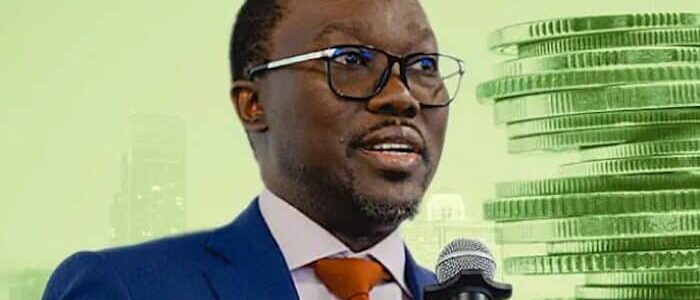
The World Bank has urged the federal government not to reverse the ongoing economic reforms, warning that such a move could have negative implications for Nigeria.
Recall that the President Bola Tinubu-led administration implemented significant policies, including the removal of fuel subsidy and the abolishment of multiple foreign exchange systems, in its first days in office.

Speaking at the launch of the Nigeria Development Update (NDU) report in Abuja on Thursday, the World Bank Country Director for Nigeria, Dr Ndiame Diop, acknowledged that while these reforms may cause temporary hardship, they are essential for the nation’s long-term stability.
Diop cautioned that “reversing these reforms would be detrimental and would spell doom for Nigeria.”

In support of the reforms, the Minister of Finance and Coordinating Minister of the Economy, Mr. Wale Edun, emphasised the federal government’s commitment to maintaining its course.
He stated, “Any effort that is not sustained will be a waste. Together with the Governor of the Central Bank of Nigeria and the Minister of Budget and National Planning, we’ve been discussing how to stay on course, tackle inflation, and ensure we move in the right direction.”
Edun elaborated that the government aims to reduce inflation while attracting investments in critical sectors like industry, where job creation is anticipated.
He noted that Nigeria expects significant investments in the coming days.
Despite the government’s consistent defence of these policies, many Nigerians have expressed concerns about their impact on everyday life.https://googleads.g.doubleclick.net/pagead/ads?gdpr=0&client=ca-pub-1896573800096815&output=html&h=300&slotname=6933664966&adk=825966356&adf=1610712057&pi=t.ma~as.6933664966&w=360&abgtt=6&lmt=1729189648&rafmt=1&format=360×300&url=https%3A%2F%2Ftribuneonlineng.com%2Fhardship-why-fg-shouldnt-reverse-ongoing-economic-reforms-world-bank%2F&host=ca-host-pub-2644536267352236&fwr=1&fwrattr=true&rpe=1&resp_fmts=3&sfro=1&wgl=1&uach=WyJBbmRyb2lkIiwiMTAuMC4wIiwiIiwiVEVDTk8gQ0Q2aiIsIjEyOS4wLjY2NjguNzAiLG51bGwsMSxudWxsLCIiLFtbIkdvb2dsZSBDaHJvbWUiLCIxMjkuMC42NjY4LjcwIl0sWyJOb3Q9QT9CcmFuZCIsIjguMC4wLjAiXSxbIkNocm9taXVtIiwiMTI5LjAuNjY2OC43MCJdXSwwXQ..&dt=1729216717027&bpp=13&bdt=2058&idt=1167&shv=r20241014&mjsv=m202410140101&ptt=9&saldr=aa&abxe=1&cookie=ID%3D6c0151f87f7aeca8%3AT%3D1723441543%3ART%3D1729216621%3AS%3DALNI_MZ0hhU61cFWkATPGSeN2GZzOd9THw&gpic=UID%3D00000ec21d4f4a78%3AT%3D1723441543%3ART%3D1729216621%3AS%3DALNI_MaVlM2X3C0E1KwqVwoZGfkaKVWPNQ&eo_id_str=ID%3Df9630fda858b77b7%3AT%3D1723441544%3ART%3D1729216621%3AS%3DAA-AfjZWegxY7vbGI7qBKP61dkFy&prev_fmts=0x0%2C360x300%2C360x375%2C330x1234&nras=1&correlator=6600858808203&frm=20&pv=1&u_tz=60&u_his=8&u_h=800&u_w=360&u_ah=800&u_aw=360&u_cd=24&u_sd=2&dmc=4&adx=0&ady=3784&biw=360&bih=608&scr_x=0&scr_y=249&eid=44759875%2C44759926%2C44759837%2C31087700%2C44795921%2C95331833%2C95344189%2C95345270%2C31088100%2C31087608&oid=2&pvsid=2121726737812435&tmod=1815430890&uas=3&nvt=3&ref=https%3A%2F%2Ftribuneonlineng.com%2F&fc=1920&brdim=0%2C0%2C0%2C0%2C360%2C0%2C360%2C608%2C360%2C608&vis=1&rsz=%7C%7CeEbr%7C&abl=CS&pfx=0&cms=2&fu=128&bc=31&bz=1&td=1&tdf=2&psd=W251bGwsbnVsbCxudWxsLDNd&nt=1&ifi=5&uci=a!5&btvi=2&fsb=1&dtd=2327
Tribune Online reports that petrol, which was sold was around N198 when President Bola Tinubu’s administration took over, has increased four times following the removal of the subsidy, and now exceeds N1,000.
Similarly, the naira, which traded below N600 to a dollar, now exchanges above N1,700 in the parallel market.
Credit: Nigerian Tribune

Moses Bot
October 18, 2024 at 5:54 pmThere should be a reversal on usage of local currency (naira) to trading on foreign currency (dollars) in oil and gas to enhance the naira which will boost it as against other currencies, thereby improving foreign trade and inflation.